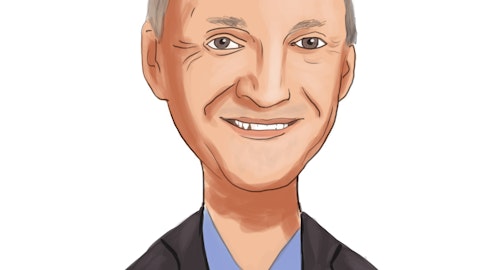Juan Carlos Mora: Okay. Regarding OpEx, we — for next year, we are expecting that OpEx should grow around 10%. Inflation in Colombia should be around, I don’t know, probably 8% or a little bit less than that, probably more towards 7%. But we have pressure on what is going to be the wages increase in Colombia, the minimum wage increase in Colombia. And we expect that to be around 10% probably or maybe even higher than that. So we will have some pressure from the cost of — from the labor cost. And regarding the general expenses, we expect those to grow less. So that’s our guidance for 2024. I don’t know, José, if you have a comment?
José Humberto: Yes. Regarding 2023, we are expecting at the end of the year an expenses growth of around 22%, and remember that the main impact of this deviation of expenses, it is because of 2 reasons: The first one is taxation related to business, that was increased more than 60% annual basis. And the second one element is FX variation, that was at around 9%. If you deduct these 2 elements, FX and taxation related to business, the expenses growth for this year is going to be at the area of 13%, aligned with the inflation that Juan mentioned at the beginning of the presentation.
Operator: Our next question is from the line of with Davivienda. Please go ahead.
Unidentified Analyst: I would like to ask you a few questions. The first one is, how are you feeling about the deterioration of asset quality indicators? Also in the 30 days and the 90 days because if we see the results, the duration has increased. But the cost of risk or the provision have decreased. The second question is regarding the taxation, effective tax rate. We have seen during the last quarters that the effective tax rate is not as higher as other — as your peers. So we would like to understand what are the reason of that and why the effective rate of Bancolombia is below its peers?
Juan Carlos Mora: Thank you, Julian. As we mentioned already, the third quarter was affected by a one-off that explains why the cost of risk was lower. And — but we see deterioration, as we already mentioned on the consumer loans, and that’s why the 30-day and 90-day past due loans increased during the quarter. As we mentioned, we expect that to be the peak for this year and that the behavior of the consumer loans during the fourth quarter should be better than the one that we had during the third quarter. Regarding taxes, our effective tax rate is lower or is low because some special — our special situation. The source of net income during this year, it’s — the distribution of that source of net income during this year is, it’s more from our operations outside Colombia than have — and those operations have a lower tax rate.
So the contribution of the Central American operations is bigger during this year. That’s why the mix between the lower tax rates outside Colombia and the tax rate in Colombia, it results in a lower effective tax rate on a consolidated basis. The other reason is that the leasing business in Colombia has a special tax treatment in the case of Colombia, so that benefit — and because we are having a good performance on that line also affects the effective tax rate. Even though the tax rate — the effective tax rates during this year is around 23%, 24%, we expect by the end of the year to end in that effective tax rate around 26%. And for next year, we expect that effective tax rate to be 28%, Julian.
Unidentified Analyst: Just a follow-up on the asset quality. I would like to know your position about the commercial loans, if there is any sector that you are worried about or in which sector that Bancolombia has, there is any like worries about the sector, anything specific like construction, energy or something like that?
Juan Carlos Mora: The loans, regarding commercial loans have been performing well. The sectors that has been affected are mainly around construction, housing construction, but that is already incorporated in our provisions. So we don’t see a particular sector that has — or with a deterioration that worries us. So it’s more regarding probably construction next year. And agriculture worries us a little bit because of climate and because of El Nino that could affect the performance of the agricultural sectors. I think, Julian, those are the main concerns that we have as of today.
Operator: [Operator Instructions]. Our next question is from the line of Andres Soto with Santander.
Andres Soto: I have a couple of questions. The first one is regarding liquidity conditions in the Colombian financial system. This year was tough due to the under-execution of the government. And we see that the budget for next year implies a significant expansion. Are you confident that this will translate in improvement in liquidity conditions? And based on that, what is your expectations for margins in 2024? That would be my first question. My second question is regarding the Nequi monetization process. Can you please walk us through how do you see this process going on? What is the source of monetization, this transactional income? It is floating, it is new loans? And when are you expecting Nequi to be accretive to Bancolombia results?
Juan Carlos Mora: Thank you, Andres, for your questions. Let me answer first your second question, and I’ll pass your first one to José Humberto. Nequi continues its evolution. Now we are focusing on separating Nequi from Bancolombia. And that’s where we are — or what we are doing now. We expect that process to end probably at the middle of next year. So Nequi will be a separate entity fully owned by Bancolombia. We continue growing the number of users, it’s now close to 18 million, 1-8 million. And the number of active users, monthly active users is close to 13 million. So the usage of Nequi is very, very, very high. And that’s a source of a lot of information. But also regarding your question of monetization of giving us the ground to move to profitability.
You ask if what is our source of monetization, and it’s going to come from different sources. Loans will be one, and we are already moving on that direction. The fees and transactions are also a source of monetization. Insurance is also a good source of monetization, but that process will take time. So summarizing, we are focusing on separating Nequi. Then from there, we will start — we will continue our journey to profitability that we will expect to consolidate during 2025, Andres. And your first question, I’m going to ask José Humberto to address.
Andres Soto: Before we go there, just a follow-up. So when you speak about the spin-off, that implies that Nequi will operate under a separate banking license?

